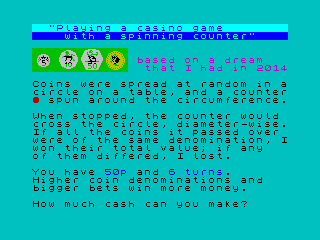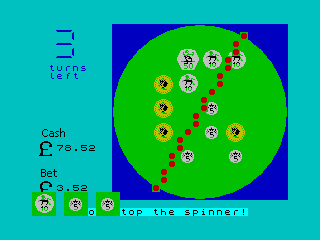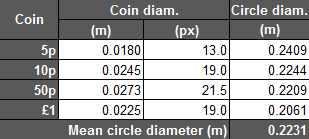Playing A Casino Game With A Spinning Counter
| Author: Paul Collins | Machine Type: Spectrum 48K |
|---|---|
| Submitted on: 23rd of April, 2020 | Download or play online |
 Dreams can be strange experiences. I should know, I’ve had some strange ones before, like the one where I got chased around by a man with a breadknife for a head. When he reached me, though, he just gave me a breadknife and then ran off in the opposite direction. Maybe it was because he wanted another set of prints on the knife? Anyway, enough digressing, many games have been based off of dreams, the most noted amongst them arguably being LSD: Dream Emulator. Our latest entry, by Paul Collins (AKA Equinox Tetrachloride), is, as you might have guessed, also based off of a dream.
Dreams can be strange experiences. I should know, I’ve had some strange ones before, like the one where I got chased around by a man with a breadknife for a head. When he reached me, though, he just gave me a breadknife and then ran off in the opposite direction. Maybe it was because he wanted another set of prints on the knife? Anyway, enough digressing, many games have been based off of dreams, the most noted amongst them arguably being LSD: Dream Emulator. Our latest entry, by Paul Collins (AKA Equinox Tetrachloride), is, as you might have guessed, also based off of a dream.
The game begins with a GambleAware warning which will be familiar to UK residents, but like Juan and his fruit machine, the disclaimer seems superfluous at best. This screen is followed by the instructions, which explain the rules of the game. For the benefit of those who have trouble reading from the screenshot, I have reproduced the text below:
Coins were spread at random in a circle on a table, and a counter • spun around the circumference.
When stopped, the counter would cross the circle, diameter-wise. If all the coins it passed over were of the same denomination, I won their total value; if any of them differed, I lost.
You have 50p and 6 turns. Higher coin denominations and bigger bets win more money.
How much cash can you make?
 Following that, we enter the game. The first four coins are scattered on the table, with very neat presentation and then we are prompted for our bet. Once we have input the size of our wager, seven more coins are scattered on the table, after which the counter begins to spin around the table. Pressing a key stops the counter, which traces over the coins diameter-wise, as described previously.
Following that, we enter the game. The first four coins are scattered on the table, with very neat presentation and then we are prompted for our bet. Once we have input the size of our wager, seven more coins are scattered on the table, after which the counter begins to spin around the table. Pressing a key stops the counter, which traces over the coins diameter-wise, as described previously.
It is at this point that the game goes a bit wacko. Firstly, the logic used in calculating the prize money is beyond me. I put down a bet of fifteen pence, the diameter crossed three pound coins. I ended up winning seventy-two quid. All I can say is that if this game existed in real life, I’d want to play it desperately! However, this kind of big prize doesn’t happen often, since the coins tend to spread in such a way as to prevent any possible wins. The character-based hit detection of the diameter doesn’t help this one bit, either. The line might not even visibly touch any of a given coin, but because it occupies said coin’s rectangular bounding-box, the program registers a touch. This is most evident with the five-pence coins.
 In addition to this, the layout of the table seems a bit unrealistic too. By measuring the pixel dimensions of the coins, and using data from the Bank of England website, I’ve calculated that the mean circle diameter would be just over 22cm; in contrast, a full-size roulette wheel has a diameter of 80cm. Of course, Paul only divulged the rules of the game in his instructions, but I imagine that if he had copied the entire journal entry, it would no doubt have described a great crush with everyone trying to crowd around the almost miniscule playing circle.
In addition to this, the layout of the table seems a bit unrealistic too. By measuring the pixel dimensions of the coins, and using data from the Bank of England website, I’ve calculated that the mean circle diameter would be just over 22cm; in contrast, a full-size roulette wheel has a diameter of 80cm. Of course, Paul only divulged the rules of the game in his instructions, but I imagine that if he had copied the entire journal entry, it would no doubt have described a great crush with everyone trying to crowd around the almost miniscule playing circle.
The difficulty of the game, however, is offset by the professionalism of the presentation. Sound is used judiciously to highlight important events, and the neatly constructed graphics draw with a speed unheard of for BASIC. That’s probably because most of the graphics drawing is performed not in BASIC, but instead with machine code.
Overall, PACGWASC is an odd experience, much as a real dream is, although that's because it was a real dream at one point. The ruleset seems oddly arbitrary and the luck involved is tougher than many other casino games, but the returns achievable are simply too huge to ignore. You can either download the game or play it online by using the links in the info-box.
Scores
| Graphics | Sound | Gameplay | Innovation | TOTAL |
|---|---|---|---|---|
| 37% | 36% | 28% | 46% | 37% |
